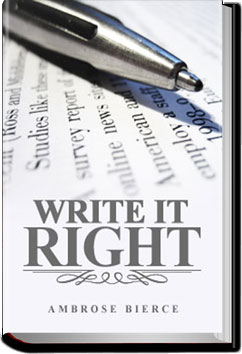

Compare with for Compare to. "He had the immodesty to compare himself with Shakespeare." Nothing necessarily immodest in that. Comparison with may be for observing a difference; comparison to affirms a similarity.
Complected. Anticipatory past participle of the verb "to complect." Let us wait for that.
Conclude for Decide. "I concluded to go to town." Having concluded a course of reasoning (implied) I decided to go to town. A decision is supposed to be made at the conclusion of a course of reasoning, but is not the conclusion itself. Conversely, the conclusion of a syllogism is not a decision, but an inference.
Connection. "In this connection I should like to say a word or two." In connection with this matter.
Conscious for Aware. "The King was conscious of the conspiracy." We are conscious of what we feel; aware of what we know.
Consent for Assent. "He consented to that opinion." To consent is to agree to a proposal; to assent is to agree with a proposition.
Conservative for Moderate. "A conservative estimate"; "a conservative forecast"; "a conservative statement," and so on. These and many other abuses of the word are of recent growth in the newspapers and "halls of legislation." Having been found to have several meanings, conservative seems to be thought to mean everything.
Continually and
Get ALL YOU CAN BOOKS absolutely FREE for 30 days. Download our FREE app and enjoy unlimited downloads of our entire library with no restrictions.
Have immediate access and unlimited downloads to over 200,000 books, courses, podcasts, and more with no restrictions.
Everything you download during your trial is yours to keep and enjoy for free, even if you cancel during the trial. Cancel Anytime. No risk. No obligations.
For just $24.99 per month, you can continue to have unlimited access to our entire library. To put that into perspective, most other services charge the same amount for just one book!

As avid readers, we understand the joy of immersing ourselves in a captivating story or getting lost in the pages of a good book. That's why we founded All You Can Books back in 2010, to create a platform where people can access an extensive library of quality content and discover new favorites.
Since our founding days, we’ve continuously added to our vast library and currently have over 200,000 titles, including ebooks, audiobooks, language learning courses, podcasts, bestseller summaries, travel books, and more! Our goal at All You Can Books is to ensure we have something for everyone.
Join our community of book lovers and explore the world of literature and beyond!
Ambrose Bierce is a clever writer, so it is not surprising, his book of literary faults is clever too. I would recommend for all College professors who are still trying to get the kids to end sentences with periods.